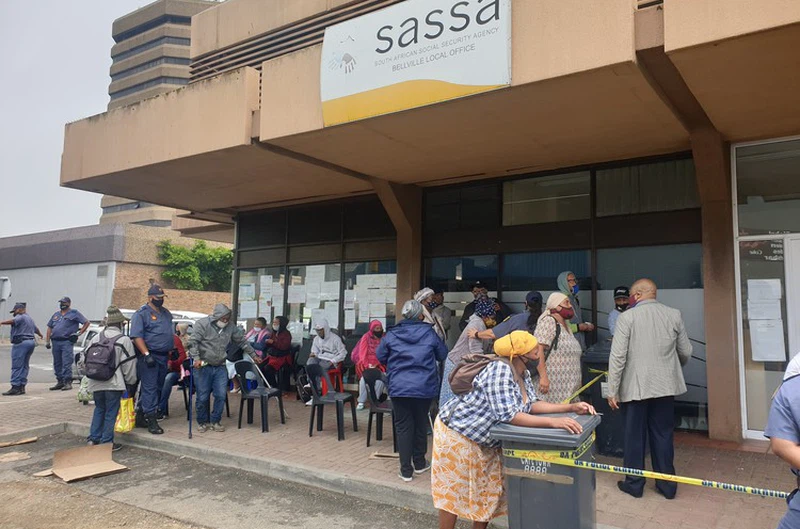

SASSA has released the payment dates for the R350 SRD grant for October. Here’s when beneficiaries can expect payment.
Here is the payment schedule for the remainder of the 2024 financial year in a neat table:
| MONTH | START DATE | END DATE |
|---|---|---|
| – | – | – |
| – | – | – |
| – | – | – |
| – | – | – |
| January | 25/01/2024 | 31/01/2024 |
| February | 23/02/2024 | 29/02/2024 |
| March | 25/03/2024 | 29/03/2024 |
The R350 SRD grant is meant for South African Citizens, Refugees, Asylum Seekers, and Special Permit holders between 18 and 60 years old. They must have insufficient means, do not receive social grants or are not contributing to or eligible for UIF payment, and have no financial support from any other source.
To apply for your SASSA SRD grant, visit the website – https://srd.sassa.gov.za.
According to the Department of Social Development, applicants will be considered for the R350 SRD grant from the date they apply.
Once you’ve submitted your application, you can track it on WhatsApp. This is one of the few platforms that SASSA has given applicants as an option to track the progress of their applications.
In South Africa, the Social Assistance Grant administered by the South African Social Security Agency (SASSA) plays a crucial role in providing financial support to vulnerable and marginalized communities. This grant system is designed to address poverty, reduce inequality, and improve the overall well-being of those facing economic hardships. This article explores the SASSA grant in South Africa, its objectives, eligibility criteria, and its impact on the lives of beneficiaries.
Background:
South Africa faces significant socio-economic challenges, with a considerable portion of its population living in poverty. In response to this, the government initiated various social assistance programs, and SASSA was established to streamline the administration of these grants. The SASSA grant system encompasses various grants, each tailored to meet the specific needs of different groups within the population.
Types of SASSA Grants:
Eligibility Criteria:
To qualify for SASSA grants, applicants must meet certain criteria, including income thresholds and specific demographic requirements. The eligibility criteria are regularly updated to ensure that the grants reach those who need them the most.
Application Process:
The application process for SASSA grants typically involves submitting relevant documentation to the nearest SASSA office. Applicants are required to provide proof of identity, income, and other necessary information to verify their eligibility.
Impact and Challenges:
The SASSA grant has undeniably had a positive impact on the lives of millions of South Africans, providing a safety net for vulnerable individuals and families. However, the system is not without its challenges, including issues of accessibility, delays in processing applications, and occasional reports of fraudulent activities. Continuous efforts are made to address these challenges and improve the efficiency of the grant distribution process.
Conclusion:
The SASSA grant system in South Africa represents a vital instrument in the government’s commitment to addressing poverty and improving the quality of life for its citizens. By providing financial support to vulnerable groups, SASSA plays a crucial role in fostering social inclusion and contributing to the overall development of the nation. As the program evolves, it is essential to maintain a balance between expanding coverage and ensuring the effective and equitable distribution of resources to those in need.
1. Q: What is SASSA, and what does it stand for?
A: SASSA stands for the South African Social Security Agency. It is a government agency responsible for administering social assistance grants to eligible individuals and families in South Africa.
2. Q: Who is eligible to apply for SASSA grants?
A: Eligibility criteria vary for different grants, but generally include factors such as income levels, age, disability status, and caregiver responsibilities. Applicants must meet specific requirements outlined for each grant type.
3. Q: How can I apply for a SASSA grant?
A: To apply for a SASSA grant, visit your nearest SASSA office and submit the required documentation, including proof of identity, income, and other relevant information. Application forms are available at SASSA offices and online.
4. Q: What types of grants does SASSA offer?
A: SASSA offers various grants, including the Old Age Grant, Disability Grant, Child Support Grant, Foster Child Grant, and Care Dependency Grant, each catering to specific needs within the population.
5. Q: Is there an age limit for the Old Age Grant?
A: Yes, the Old Age Grant is specifically for individuals aged 60 and above who have reached retirement age.
6. Q: Can I receive more than one type of SASSA grant?
A: In some cases, individuals may qualify for more than one type of grant, depending on their circumstances. However, specific eligibility criteria must be met for each grant.
7. Q: How often are SASSA grants paid out?
A: SASSA grants are typically paid out on a monthly basis, providing a regular source of income for beneficiaries.
8. Q: Are SASSA grants taxable?
A: No, SASSA grants are not taxable. They are considered social assistance and are not subject to income tax.
9. Q: What should I do if my SASSA grant application is rejected?
A: If your application is rejected, you have the right to appeal the decision. Contact your local SASSA office for information on the appeals process and the necessary steps to take.
10. Q: Can I check the status of my SASSA grant application online?
A: Yes, SASSA provides an online portal where applicants can check the status of their applications. Visit the official SASSA website for more information on online services and application tracking. https://srd.sassa.gov.za.